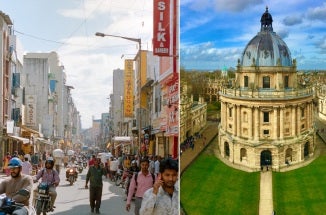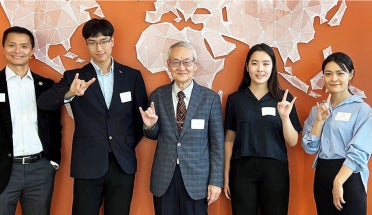
President’s Award for Global Learning 2022 Faculty Programs Awarded
- Sep 9, 2021
- Global Initiatives
Three innovative faculty programs partnering with international businesses and universities in Sweden, India, the United Kingdom, and Ecuador have been selected to receive the President’s Award for Global Learning. These are the first programs selected within the renewed vision of the award, designed to increase student involvement in solving global challenges and strengthen faculty interdisciplinary collaborations.
The programs address timely and important global issues, including the ethics of global supply chains, anti-racism in academia, and environmentally sustainable architectural design. Students who participate will engage in project-based teams with international partners and faculty mentors to tackle these complex issues.
The President’s Award for Global Learning empowers students and faculty to examine real-world interdisciplinary topics while incorporating in-country learning into the classroom experience. Each awarded faculty team has identified a challenge that can be addressed with an international partner in a global context.
Student teams are now invited to propose projects that fit within the approved program themes, listed below. Interested students should attend an information session and participate in the upcoming virtual Team Match Event on Friday, October 1. The application deadline for students is November 1.
The awarded faculty/student teams will implement their projects between January and December 2022. Faculty teams receive $5,000 to support the student projects and class activities, and individual faculty members each will receive a $9,000 honorarium. Faculty and students also will receive fully funded travel as part of the award.
2022 Faculty Programs Awarded
Cotton Threads: Fabricating Ethical Production and Consumption in the Garment Industry
Faculty team members:
Shiv Ganesh, Ph.D., Professor, Department of Communication Studies, Moody College of Communication
Sharmila Rudrappa, Ph.D., Professor, Department of Sociology, College of Liberal Arts
International Partners:
Nudie Jeans – Gothenburg, Sweden
International Institute of Information Technology Bangalore – Bangalore, India
This faculty-led program aims to help students learn about the ethical production and consumption of high fashion through coursework, field visits, and independent research in three sites: Texas, Sweden, and India. The program team will partner with the company Nudie Jeans, headquartered in Gothenburg, Sweden, working with their suppliers and academic collaborators in Bangalore, India. Program goals are to teach students how the company strives to: achieve ecological sustainability; instill social justice across production nodes in global commodity chains for growers, textile workers, and garment workers; and offer radical transparency to consumers on ethical production processes and profits. Students will have the opportunity to integrate the skills and knowledge developed over Spring and Summer 2022 to test Nudie Jeans’ business model in Texas, which is the largest grower of cotton in the U.S.
Addressing an Era of Transatlantic Racial Reckoning: Imagining Anti-Racist Academic Worlds in the United Kingdom and the United States of America
Faculty team members:
Richard Reddick, Ed.D., Professor, Department of Educational Leadership, College of Education
Peniel Joseph, Ph.D., Professor, Lyndon B. Johnson School of Public Affairs
International partners:
Dr. Mike Mimirinis – University of West London, United Kingdom
Dr. Peter Claus – Pembroke College, Oxford University, United Kingdom
Dr. Kehinde Andrews – Birmingham City University, United Kingdom
Dr. Ali Meghji – Magdalene College, Cambridge University, United Kingdom
This program will bring together perspectives from faculty, staff, and students in five unique higher education environments—four in the United Kingdom, one in the United States—to identify and validate experiences of BIPOC members of their respective communities. Participants will identify commonalities and differences between the institutional contexts and engage in discussions about the shared and unique aspects of navigating an academic existence for BIPOC community members.
Do-No-Harm, Do-More-Good: Building for Sustainability in the Galápagos
Faculty team members:
David Heymann, M.Arch., Professor, School of Architecture
Gregory Brooks, M.Arch., Professor, Department of Civil, Architectural, and Environmental Engineering, Cockrell School of Engineering
Jayme Walenta, Ph.D., Lecturer, Department of Geography and the Environment, College of Liberal Arts
International partners:
University of San Francisco-Quito, Quito, Ecuador
Buro Happold, Bath, United Kingdom
This program will research innovative and implementable solutions for the design of sustainable human habitats that do no harm to—and do more good for—ecologies surrounding the Galápagos Islands of Ecuador. The area’s fragile ecosystem is threatened by a recent surge in land-based tourism, a critical source of revenue for the expanding population. Participants will consider the ways sustainable relations can develop between natural environments, human uses and needs, and buildings and built infrastructure. Students will establish and enact their projects in collaboration with stakeholders that include the University of San Francisco-Quito, global engineering firm Buro Happold, Galápagos islanders, government officials, environmental engineers, economists, and theoreticians, giving the students and university an opportunity to add value to this unfolding and real-world challenge.



